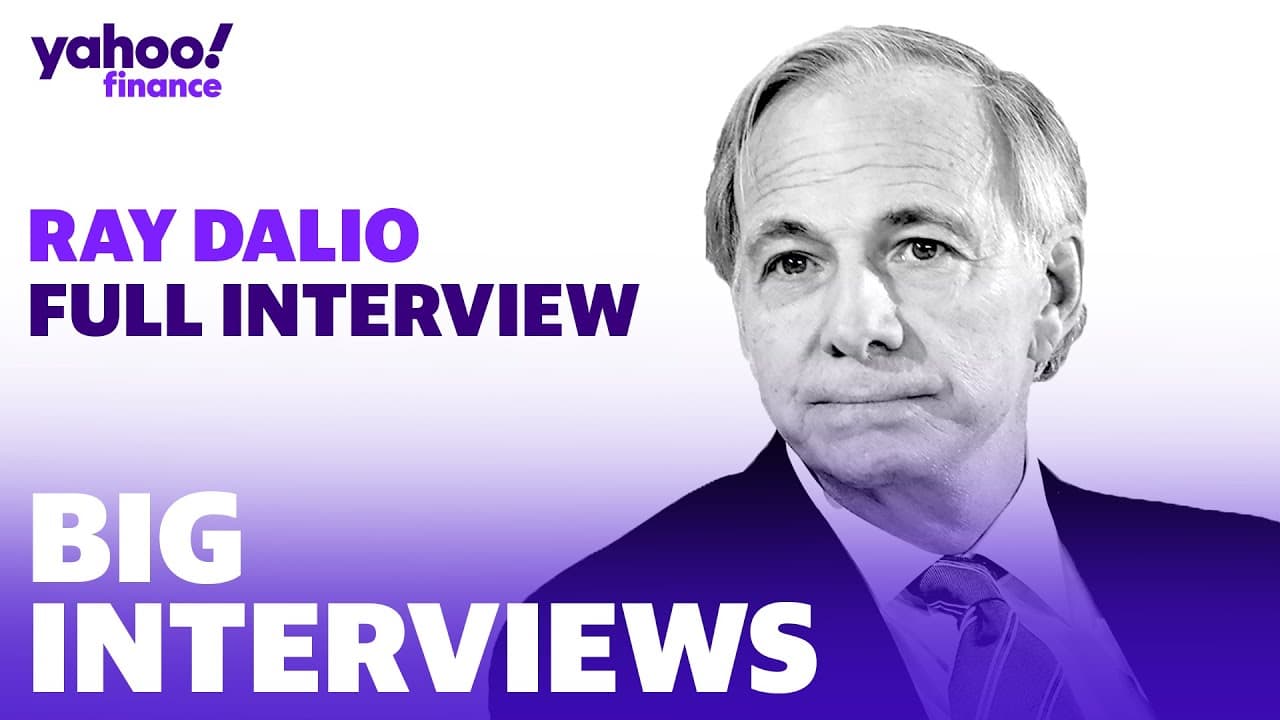Billionaire Ray Dalio discusses the stock market, stimulus, bitcoin, China, and taxing the wealthy
14 Feb 2024 (almost 2 years ago)

Intro (0s)
- Ray Dalio, a hedge fund billionaire and investing legend, discusses the stock market, stimulus, bitcoin, China, and taxing the wealthy.
- Dalio made his first stock pick at age 12 and at 26 launched Bridgewater Associates, now the biggest hedge fund in the world.
Markets (1m10s)
- The market volatility is due to the unprecedented stimulus measures taken by governments and central banks in response to the COVID-19 pandemic.
- The massive stimulus has led to low real interest rates and abundant money supply, causing a rise in financial asset prices and a decrease in future expected returns.
- The supply-demand question arises as the government needs to sell a lot of debt, and the demand for it is uncertain, potentially requiring further monetary intervention by the Federal Reserve.
Stimulus (3m42s)
- Dalio believes that the amount of stimulus coming from Washington may be excessive in terms of supply and demand.
- While acknowledging the significant needs and gaps in society, Dalio emphasizes the risks and costs associated with excessive stimulus.
- He highlights the importance of considering the long-term effects and potential unintended consequences of such policies.
Flood the zone (5m12s)
- Debt can be used to mitigate social problems, but it can lead to overshooting and consequences.
- Debt can be productive if it increases productivity, but if not, the bondholder or cash holder will pay the consequences.
- The current situation is a result of an emergency situation with COVID mixed with a political situation.
Inflation (6m20s)
- There are two types of inflation: supply-demand inflation and monetary inflation.
- Supply-demand inflation occurs when demand presses against the capacity to produce things, causing prices to rise.
- Monetary inflation occurs when the value of money goes down.
- The current situation is more likely to lead to monetary inflation than supply-demand inflation.
- Monetary inflation can occur when people don't want to own bonds or cash and shift their investments to other assets, causing financial inflation and a wealth effect.
- Central banks may choose to raise rates to combat inflation, but this can be bad for financial asset prices and the economy.
- Alternatively, central banks may make purchases to offset the decline in bond prices, leading to more monetary inflation.
V bottom (9m20s)
- The V-bottom in the stock market a year ago was due to the dynamics of debt and money.
- The same action was taken on April 8th or 9th, 2020, as on August 15th, 1971, and March 5th, 1933.
- These actions represent a separation in terms of the value of money and a new paradigm.
Stock rotation (9m53s)
- Ray Dalio believes that the current bull market in bonds has been going on for 40 years and that interest rates are extremely low.
- Dalio thinks that the Federal Reserve may implement a cap on rates to keep short-term interest rates low in relation to the cap, similar to what was done in the 1930s.
- He also believes that Bitcoin has proven itself over the last 10 years and is an alternative storehold of wealth.
- Dalio suggests that there is a possibility that the government will outlaw Bitcoin because it is a bad investment relative to other things and they don't want the money to go elsewhere.
Biden Administration (17m57s)
- The Biden administration faces challenges due to the extreme elements within both political parties, making it difficult to find a middle ground.
- Significant tax increases are expected, which may affect asset prices and capital flows.
- The wealth tax proposal aims to study cases from different countries and learn from their experiences.
- No sustained wealth tax has been successful in raising a significant amount of money.
- Easier ways to tax wealth, such as stepped-up basis and inheritance tax, may become more popular.
- The environment should be hospitable for capitalism and capitalists to ensure capital flows.
- Foreigners own more American bonds than Americans, so the safety of the market for capitalism affects capital flows.
Relationship with China (22m29s)
- China has risen from poverty to become a strong competitor to the US in terms of power and prosperity, especially in areas like AI and quantum computing.
- The US-China relationship is undergoing a challenging phase due to China's growth and the US's internal issues.
- China believes the US is trying to suppress or compress its growth.
- Tensions between the US and China are likely, but it remains to be seen if either side will become too confrontational and prevent a natural evolution of the situation.
- China's strengths lie in its entrepreneurship, new business creation, and overall energy and innovation.
Bridgewater (25m22s)
- Ray Dalio discusses the transition at Bridgewater, expressing his gratitude for the support of David McCormick and the long-term dedication of his team.
- Dalio highlights the challenges faced during the pandemic, particularly in the second quarter, but emphasizes the subsequent rebound and valuable lessons learned.
- Dalio emphasizes the enduring importance of meditation, which has provided him with equanimity, creativity, and a deeper understanding of his subconscious.
- He reiterates the significance of Bridgewater's culture as an idea meritocracy, prioritizing meaningful work and relationships, fostered through radical truthfulness and radical transparency.
- Dalio stresses the importance of learning from failures, citing his own experience in 1982, and the value of stress testing ideas through radical truthfulness and strategic transparency.